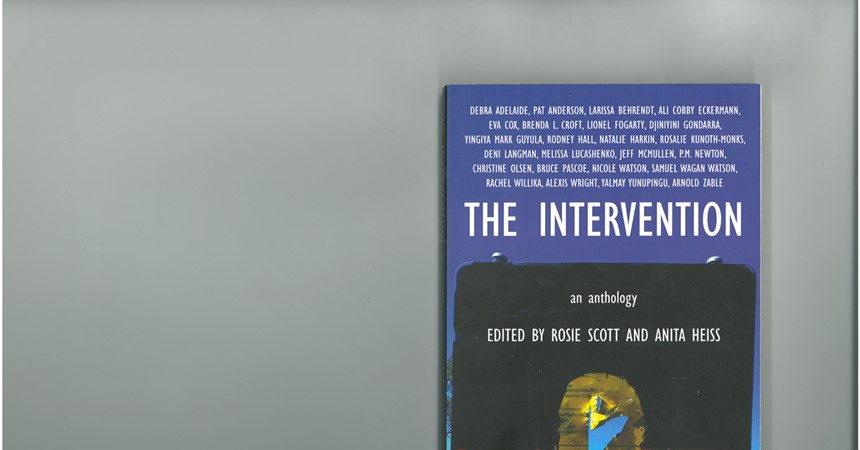“ Yes. Yes, of course the government should do something…But not this…”
So said esteemed Aboriginal writer Alexis Wright to esteemed Aboriginal writer Melissa Lucashenko concerning “the Intervention”.
“Bad programs, appallingly delivered,” writes Eva Cox. And she shows why and how. A vast number of dollars for limited benefit and enormous human deficit, with the assumption that “lack of progress stems from recipients’ failures…not bad processes by policy makers”.
In 2007, the soldiers came with their guns. The first experience of the Intervention for many was terror. Do we run into the bush to prevent their taking our kids, to avoid being shot? The dread and panic is palpable in the relating. Rachel Willika’s eloquent and powerful telling inspired Rosie Scott to compile this anthology.
Twenty of our finest Indigenous and non-Indigenous writers, memoirists, poets, commentators and elders come together to inform, appal and inflame.
Words versus words. The words of those impacted, and their supporters, are “an inspiring antidote to the spin and disinformation which has been the official language of the Intervention up until now”. Currently called “Stronger Futures”, it is “Stolen Futures” to Deni Langman, Traditional Owner of Uluru.
I worked for 'the Welfare'. My first district in the late 1970s was Windale, Newcastle’s ‘problem’ area. White wisdom had warned me that Aboriginal parents wasted children’s money on blow-ins from the bush. A gross misrepresentation, I found. It was hospitality, generosity, sharing, a spirit of belonging. I was edified, but still had to do something about the kids’ welfare. I sat down with women – grandmothers and aunts – influential, wonderful women. They made my job easy. Three years there, and I removed no Aboriginal child. Listening, understanding better, and working with respected elders kept me from being more damaging when I intervened.
Why, in 2007, was the army sent in? Why was discrimination revived? Why were paternalistic practices reintroduced? Under the guise of child protection was it the lure of El Dorado, a land grab? The pretext, “the ‘national emergency’ that had sat neglected for over thirty years”, is shown up for its falseness.
Incredulity, lament and frustration come through in this anthology. Then anger.
Why were successful Aboriginal initiatives discarded?
Why was the key recommendation of the Anderson-Wild Inquiry to work with Aboriginal communities ignored?
How does Indigenous control of their lands tie into the issue of child sexual abuse?
Why are factual reports on the failures of the Intervention not given prominence?
Why does it continue against the evidence?
The wisdom of Indigenous ways is clear in these writings. The contrasting inhumanity of bureaucratic, ideologically-driven paternalism cannot be missed. Good governance contrasts with control. Respectful dialogue contrasts with brutal imposition. “Thousands of years’ custodianship versus two centuries of contested ‘ownership’,” opines Brenda L Croft.
Rodney Hall invites us to imagine how we would have felt if the Japanese invasion had succeeded, if hordes of foreigners had imposed their ways, discarded ours and set us under their superior heel. Imagine, too, “what an outcry there would be if the government sent the same army personnel to intervene after accusations against the Roman Catholic Church”.
“Bread” by Bruce Pascoe is an eye-opener. I wasn’t taught about humanity’s first bread makers; about explorers discovering houses, towns, ovens, food preservation, grain and flour silos (from which they stole); about intricate systems of fish harvesting – probably the world’s oldest construction; about Aboriginal gardens with irrigation. Why does damaging ignorance about Aboriginal sophistication persist?
This history, ancient and current, needs to be known. The human suffering has to be felt. Intervention as imposition must end.
Read, evaluate, and determine to work together for a more glorious, shared, Australian humanity.
The Intervention: an anthology, edited by Rosie Scott and Anita Heiss, was launched in Sydney on 1 July by Professor Gillian Triggs, President of the Australian Human Rights Commission.























































































